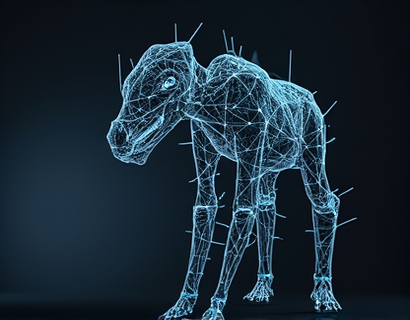Decentralized Authentication: Empowering Businesses with Advanced Security and Seamless Access Solutions
In the digital age, the importance of robust security measures cannot be overstated. For businesses, safeguarding sensitive data and ensuring secure access to systems and applications is paramount. Traditional authentication methods, while effective to some extent, often fall short in providing the level of security and efficiency required in today's complex digital landscape. Decentralized authentication solutions are emerging as a transformative approach, offering advanced identity management that not only enhances security but also ensures a seamless user experience. This article delves into the benefits and mechanisms of decentralized authentication, exploring how it is reshaping the way businesses manage access and protect their assets.
Understanding Decentralized Authentication
Decentralized authentication, also known as decentralized identity management, is a method of verifying user identities without relying on a central authority or server. Unlike traditional centralized systems where a single point of control manages all authentication processes, decentralized systems distribute this responsibility across a network of nodes. This distribution is achieved through blockchain technology, distributed ledgers, or other decentralized protocols.
Key Characteristics of Decentralized Authentication
- Decentralization: Authentication is managed across a network of nodes rather than a single server, reducing the risk of a single point of failure.
- Transparency: Transactions and identity verifications are recorded on a public ledger, ensuring transparency and accountability.
- Security: The use of cryptographic techniques and distributed consensus mechanisms makes it extremely difficult for unauthorized parties to manipulate or tamper with authentication data.
- User Control: Users have greater control over their identity data, deciding who can access it and for what purposes.
Advantages of Decentralized Authentication for Businesses
The adoption of decentralized authentication solutions offers numerous benefits for businesses, particularly in terms of security, efficiency, and user experience.
Enhanced Security
One of the most significant advantages of decentralized authentication is the enhanced security it provides. By eliminating the need for centralized databases, the risk of large-scale data breaches is significantly reduced. Even if one node in the network is compromised, the entire system remains secure due to the distributed nature of the network. Additionally, the use of advanced cryptographic techniques ensures that identity data is protected from unauthorized access and manipulation.
Improved Compliance and Regulatory Adherence
Businesses operating in industries with strict regulatory requirements, such as finance, healthcare, and government, can benefit greatly from decentralized authentication. These solutions help ensure compliance with data protection regulations like GDPR and HIPAA by providing transparent and auditable records of identity verifications. The immutable nature of blockchain technology ensures that all transactions are traceable, making it easier to demonstrate compliance during audits.
Reduced Operational Costs
Centralized authentication systems often require significant investments in infrastructure, maintenance, and security measures. Decentralized solutions, on the other hand, can reduce these costs by eliminating the need for expensive central servers and reducing the workload on IT departments. The automation and self-sovereign nature of decentralized identities mean that businesses can operate more efficiently, with fewer resources dedicated to managing authentication processes.
Seamless User Experience
Decentralized authentication does not compromise on user experience. In fact, it often enhances it. Users can manage their identities across multiple platforms and services without the need for multiple passwords or cumbersome login processes. Self-sovereign identity (SSI) frameworks, a key component of decentralized authentication, allow users to control their digital identities and share specific attributes with service providers as needed. This not only simplifies the login process but also empowers users to maintain privacy and sovereignty over their personal data.
Implementing Decentralized Authentication: Best Practices
For businesses looking to adopt decentralized authentication solutions, several best practices can ensure a smooth and effective implementation.
Conduct a Thorough Needs Assessment
Before implementing a decentralized authentication system, it is crucial to conduct a comprehensive needs assessment. Identify the specific security and access control requirements of your business. Consider factors such as the types of data to be protected, the number of users, and the integration with existing systems. This assessment will help in selecting the right decentralized solution that aligns with your business goals.
Choose the Right Technology Stack
Selecting the appropriate technology stack is essential for a successful implementation. Blockchain platforms like Ethereum, Hyperledger Fabric, and Corda are popular choices for building decentralized identity systems. Each platform has its strengths and use cases, so it is important to evaluate them based on your specific needs. Additionally, consider integrating with existing identity management systems to ensure a seamless transition.
Focus on User Education and Adoption
User adoption is a critical factor in the success of any new authentication system. Educate your employees and users about the benefits of decentralized authentication and provide clear guidance on how to use the new system. Offering training sessions, creating user-friendly documentation, and providing support can help facilitate a smooth transition and ensure high adoption rates.
Ensure Scalability and Flexibility
As your business grows, your authentication system should be able to scale accordingly. Choose a decentralized solution that is scalable and flexible, capable of handling increasing numbers of users and expanding to new services and platforms. This will ensure that your authentication system remains effective and efficient over time.
Case Studies and Real-World Applications
Several businesses across various industries have successfully implemented decentralized authentication solutions, reaping the benefits of enhanced security and streamlined access.
Case Study: Financial Services
A major bank implemented a decentralized authentication system to improve the security of its online banking platform. By using blockchain-based identity verification, the bank reduced the risk of fraud and data breaches. Users could manage their identities through a mobile app, allowing them to access banking services with just a few taps. The system also simplified the onboarding process for new customers, reducing the time and resources required for manual verification.
Case Study: Healthcare
A healthcare provider adopted a decentralized authentication solution to ensure secure access to patient records. By leveraging self-sovereign identity, patients could control who had access to their medical data, sharing it only with authorized healthcare providers. This not only enhanced patient privacy but also improved the efficiency of care coordination, as providers could access necessary information quickly and securely.
Case Study: Government Services
A government agency implemented a decentralized authentication system to streamline citizen access to various online services. The system used blockchain to verify identities and ensure that only authorized individuals could access sensitive information. This approach reduced the administrative burden on government employees and provided citizens with a more convenient and secure way to interact with public services.
Challenges and Considerations
While the benefits of decentralized authentication are clear, there are also challenges and considerations that businesses should be aware of.
Technical Complexity
Decentralized authentication systems can be technically complex, requiring specialized knowledge to implement and maintain. Businesses may need to invest in training for their IT staff or partner with experts in blockchain and decentralized technologies. However, the long-term benefits often outweigh the initial learning curve.
Interoperability
Ensuring interoperability between different decentralized systems and existing infrastructure can be a challenge. It is important to choose solutions that are compatible with a wide range of platforms and standards. Industry consortia and open standards initiatives can help address this issue by promoting interoperability across different decentralized identity systems.
Regulatory Uncertainty
The regulatory landscape for decentralized technologies is still evolving. Businesses should stay informed about relevant regulations and ensure that their authentication solutions comply with current and future requirements. Engaging with regulatory bodies and participating in industry discussions can help shape policies that support the adoption of decentralized authentication.
Conclusion
Decentralized authentication represents a significant advancement in the field of identity management, offering businesses advanced security, improved compliance, and a seamless user experience. By distributing authentication processes across a network of nodes, these solutions mitigate the risks associated with centralized systems and empower both businesses and users. As the technology continues to mature and gain wider adoption, it is poised to play a crucial role in shaping the future of digital security and access control.











































